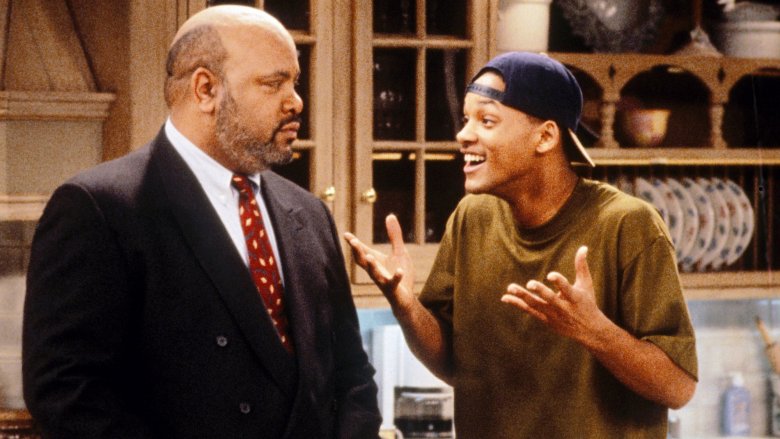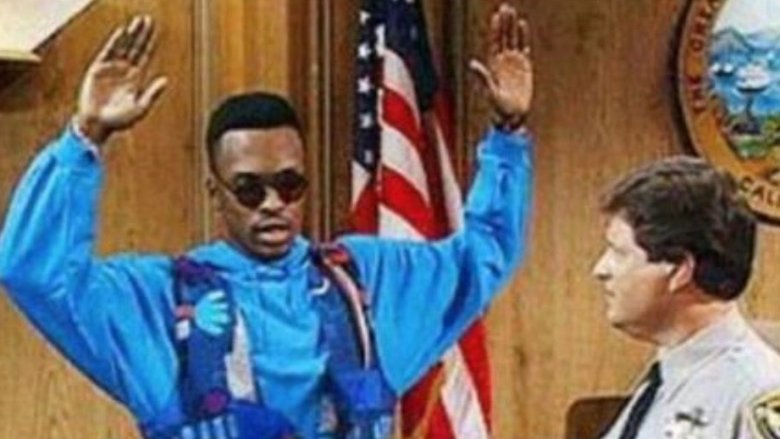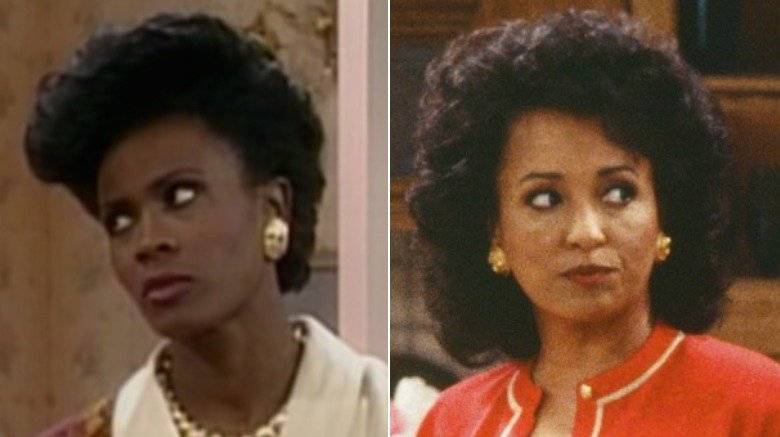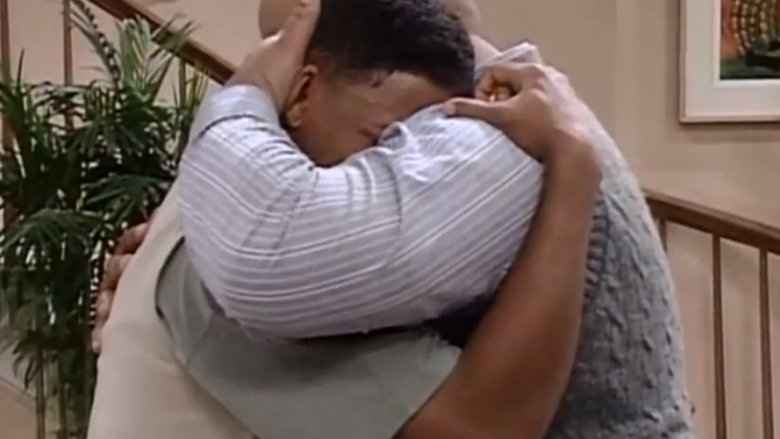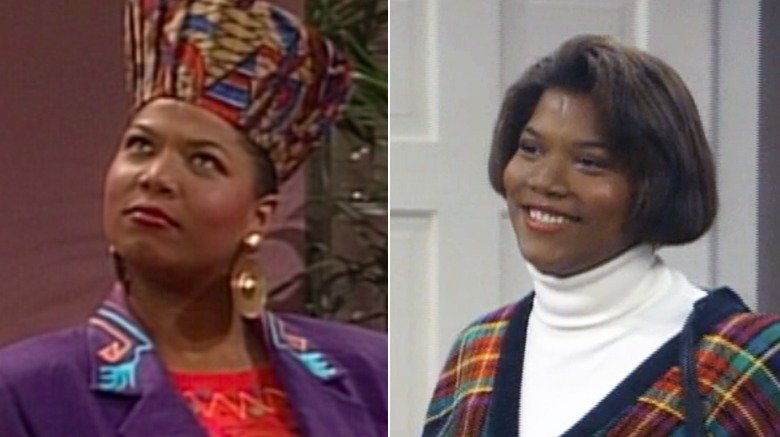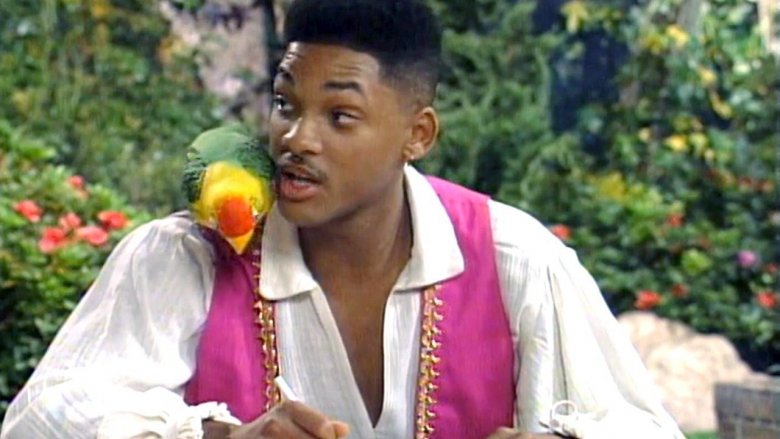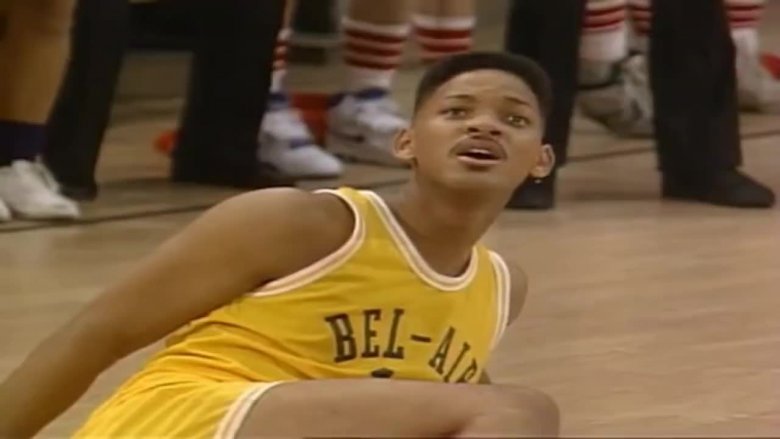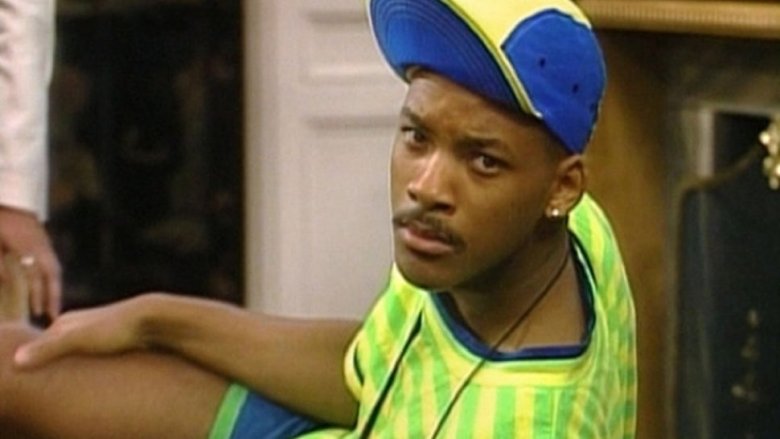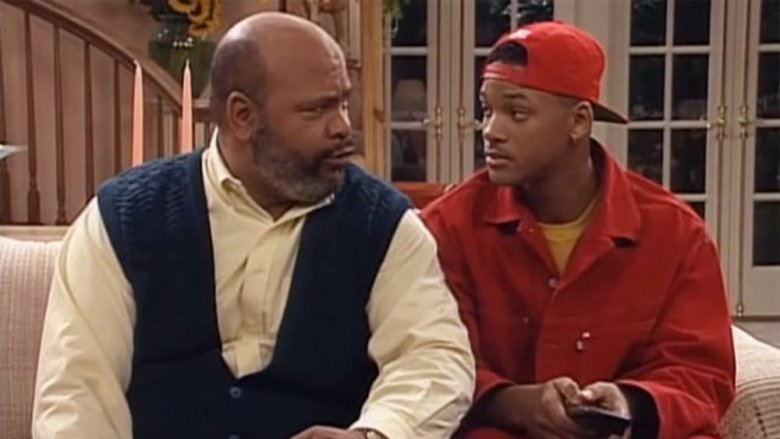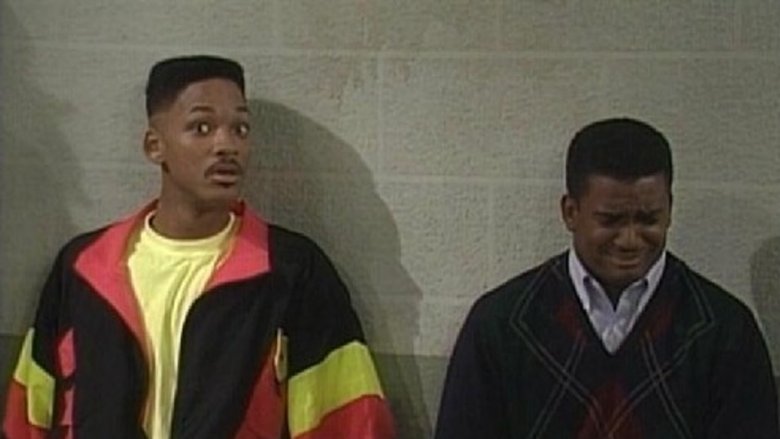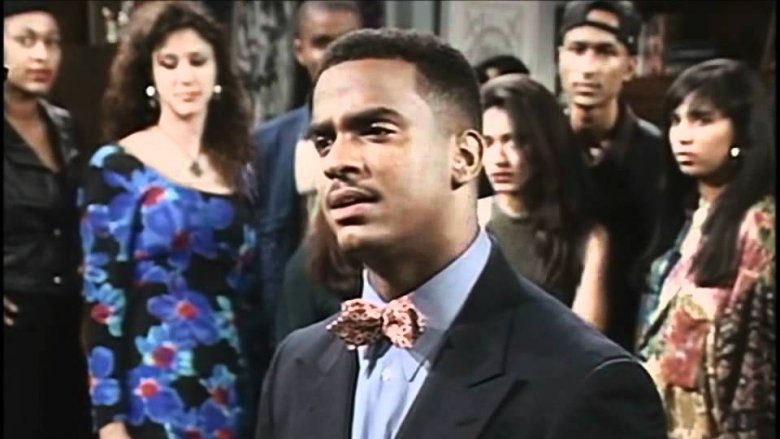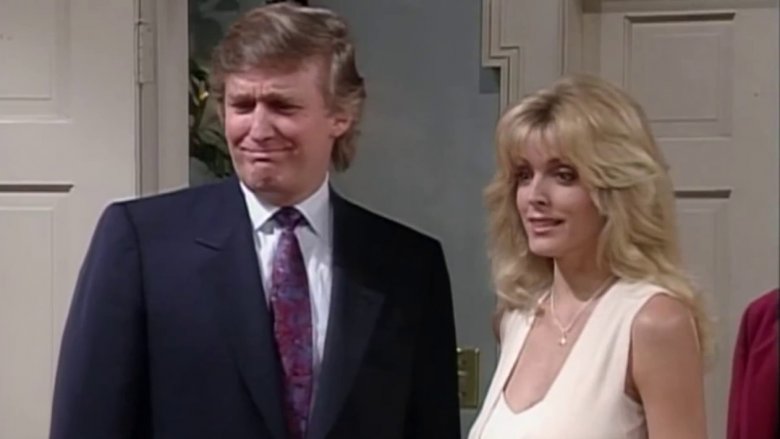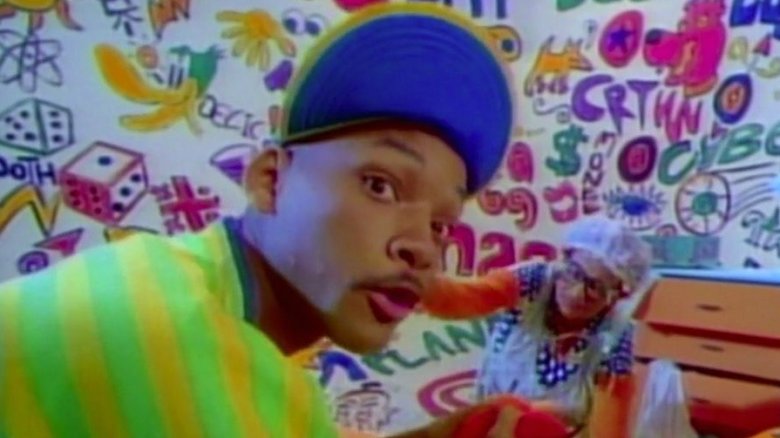Things Only Adults Notice In Fresh Prince Of Bel-Air
For an entire generation of kids, The Fresh Prince of Bel-Air hit all the right notes for a television show. It was funny, entertaining, and adult-themed enough to be edgy while still safe enough for parents to allow. For six seasons, the show covered common teenage themes, yet it still felt, well, fresh and ahead of its time. Part of that had to do with the show bringing African American representation to mainstream television, but the Fresh Prince also took on complex issues in a way that resonated with kids, even if they didn't realize it until much later in life.
Though the show may not have the same punch it did in the '90s, the series still impresses decades after its premier in 1990. In fact, for younger fans of the show, many moments may mean even more now. There were jokes and drama that simply went over kids' heads at the time, as well as poignant moments that took on new or deeper meaning with more time and perspective. With that in mind, let's examine some of the things only adults notice in The Fresh Prince of Bel-Air.
Hands up, don't shoot
After Michael Brown was shot and killed by police in 2014 in Ferguson, Mo., the slogan "Hands up, don't shoot" became a rallying cry for the Black Lives Matter Movement. According to CNN, "protesters, pro athletes, Broadway performers and congressional staffers have used the gesture in public in a show of solidarity." Consequently, adults watching the Fresh Prince episode titled "Cased Up" will see something much different than they did as kids.
In the 1991 episode, Jazz and Will are in court, and Jazz is called to the stand because he witnessed Will wreck his new car. When the bailiff tries to swear him in, Jazz refuses to lower his hands from the surrender position. Jazz quips: "No way, dude's got a gun. Next thing you know, I got six warning shots in my back." The audience cackles, but Jazz's joke carries far more political weight today, and it's also worth reexamining its implications back then.
Months before "Cased Up" aired, the Rodney King incident had elevated tensions between police and the black community. As noted by Elite Daily, that scene in the sitcom likely intended to connect to the King controversy. While some kids may have picked on that link at the time, we'd argue that few would miss the message today, considering the tragic string of controversial cases involving police and minorities that have made headlines in recent years. The sad fact that this "joke" still makes sense nearly 30 years later adds even more to its impact.
Making light of a big beef
Nearly every Fresh Prince fan, young and old, is aware that the actress playing Aunt Vivian Banks changed between Season 3 and 4. Over the years, the switch from Janet Hubert to Daphne Maxwell Reid — and the controversy surrounding it — has been discussed at length, but at the time, few kids would have been aware of the drama behind the scenes.
Back in 1993, Will Smith discussed Hubert's departure (via The Hollywood Reporter). "She has basically gone from a quarter of a million dollars a year to nothing," he said. "She's mad now but she's been mad all along. She said once, 'I've been in the business for 10 years and this snotty-nosed punk comes along and gets a show.' No matter what, to her I'm just the AntiChrist." Hubert sang a different song. "He has gotten me fired from the show and now he is trying to snatch my career away from me..." she alleged in a 1993 interview. "Anyone who stands up to Mr. Smith on 'Fresh Prince' is gone."
Fully understanding this behind-the-scenes beef adds new meaning to one particular moment in the Season 4 premiere. During "Where There's a Will, There's a Way," Jazz notices "there's something different about" Aunt Viv (now played by Reid). Will responds by looking sheepishly at the camera. Breaking the fourth wall humorously acknowledges the actress swap and relieves some tension. Unless, of course, you're siding with Hubert, in which case, Will's subtle move feels like a big dig.
Papa's got a brand new cry
If you only remember a single episode from The Fresh Prince of Bel-Air, we're willing to bet it's "Papa's Got a Brand New Excuse." Considered one of the most powerful and most-watched moments in the series, this touching 1994 episode left its mark on audiences. And yet, it's very possible that you missed something interesting in the famous "How come he don't want me" clip. Of all the urban legends about this scene — including the one that claims the scene was inspired by Will Smith's real-life father abandoning him (not true) — there is one theory that seems plausible.
In the scene, as Will and Uncle Phil embrace, just after Uncle Phil tosses Will's hat aside, a different cry is heard. It sounds female, and it sounds familiar. According to a think piece in The Huffington Post, actress Karyn Parsons, who plays Hilary, "can be heard weeping offstage during the scene." In addition, actor Ben Vereen, who plays Will's father, reportedly "broke into tears immediately after walking away from Will."
Repeating characters
It doesn't take an adult to spot the same actor playing two different characters, but it's certainly easier for grown-ups to notice when a well-known actor is assuming multiple roles. In The Fresh Prince of Bel-Air, there are several actors who were brought on to play multiple minor roles, but three of these faces are now household names.
When Nia Long was cast as Lisa Wilkes on Fresh Prince, she wasn't yet a household name. In fact, it was largely because of this role that she shot into the spotlight. However, before Long played Lisa on the show, she played Claudia Prescott, the girl that Will takes to a dance instead of Dee Dee in the Season 2 episode titled "She Ain't Heavy." Dee Dee is played by Queen Latifah, who also portrays actress Marissa Redman in Season 1 of Fresh Prince. And get this: Sherman Hemsley, the actor who plays Judge Carl Robertson in Season 3, returns to the show in Seasons 5 and 6 to reprise the role that made him a star in the '70s — that of George Jefferson from All in the Family.
Homophobic humor hasn't aged well
Not every joke on The Fresh Prince of Bel-Air has aged well. While's it's entirely likely that kids in the early '90s missed the gay joke in "Will Gets a Job," adults probably picked up on the homophobic humor. In the episode, Uncle Phil tries to have a heart-to-heart chat with a waiter, who is dressed as a pirate, who he thinks is Will. "Today you've shown me that you are a very, very fine young man, and I just want us to be closer together," Phil says. The waiter turns around, revealing that he is not Will, and angrily replies: "What did you say, pervert? Look, man, this is Treasure Island, okay? Now, Pleasure Island? That's a block down the street."
Phil tries to explain the mistake, but the waiter cuts him off. "I know what you thought, but if you'll notice, the parrot is sitting on my left shoulder." The audience chuckles and guffaws at the joke, which is a reference to the so-called "piercing fad" that suggested a single ear piercing in one's right ear could serve as a subtle way to indicate that a man was gay.
Broken hoop dreams
While the basketball plot line in The Fresh Prince of Bel-Air is often considered a plot hole, there may be something more important at work — something that we didn't appreciate when we were kids. In the early episodes of the show, Will was a basketball god. He single-handedly beat other high school teams, but then he suddenly stopped playing. Why? It seems entirely plausible that Will could have netted a basketball scholarship. After all, in "My Brother's Keeper," he plays an incredible game with a college scout in the stands, but that episode also brings up an important point.
Will lets an opposing player named Marcus Stokes win because Stokes has a kid and Will thinks making it to the pros could be Stokes' ticket to a better life. Stokes rails against that line of thinking, telling Will he's been watcing "too many Hallmark movies." Stokes has he's not depending on basketball. "I'm depending on this," he says, gesturing to his brain. "My b-ball scholarship is going to get me a free education in engineering so that I can provide for my family with my mind."
According to The Guardian, "Common role models [for men of color] depicted by the media such as rap or hip-hop stars and basketball players imply limited life choices." Rather than dig its heels into this trend, the Fresh Prince may have decided to intentionally stray from this plot line to provide viewers with a different perspective.
Breaking through the fourth wall in a big way
Will Smith made a habit of breaking the fourth wall and addressing the audience. It doesn't take an adult brain to spot these moments. It does, however, take time and perspective to truly grasp how monumental some of the show's fourth-wall-breaking moments truly were. As Bustle notes, it wasn't unusual for family sitcoms to break the fourth wall, but "Fresh Prince distinguished itself with a wry attitude" that "wasn't even confined to the parameters of its own set."
While there were several effective uses of the device throughout the show, some of the best examples occur during Season 5. In "Will's Misery," for example, Will turns the tables on one of Carlton's pranks and makes Carlton think something tragic has occurred. Carlton, played by actor Alfonso Ribeiro, runs out the door yelling "No! Noooooo!" and proceeds to keep going and going. He runs through all of The Fresh Prince of Bel-Air sets, then runs through the live studio audience as the show ends.
There's also the scene in "Same Game," when Will asks: "If we so rich, why we can't afford no ceiling?" As he says this, the camera pans up to show the set's lighting. While there's no age limit to appreciate breaking the fourth wall, few kids at the time could have known how memorable these little moments would become in television history.
Redefining fatherhood
When rapper J. Cole calls Uncle Phil "the only father I ever knew" in his song "No Role Modelz," he's acknowledging The Fresh Prince of Bel-Air's positive representations of a black father figure on '90s kids television. Philip Banks (played by actor James Avery) represents a caring and compassionate man who deviates from the all-too-present image of the absentee black father – a pervasive and distorted stereotype. According to Vulture, Uncle Phil and the few others like him on television are "important for how they refute the noxious mythology of the missing black father." These characters helped pave the way for the more nuanced representations on television today.
When Avery died, co-star Karyn Parsons (who plays Phil's daughter, Hilary Banks) said she was inundated with messages from people affected by her TV dad. "They thought of him like a father," she said, "Like 'That's the father I wanted. That was my dad.'" It may have taken some growing up to realize how important Uncle Phil was in the landscape of television fathers, but there's a generation of kids (and adults) who may be better off because they witnessed it.
Driving while black
The Fresh Prince of Bel-Air wasn't short on poignant moments, but, for kids, not all of them touched down in the same way. That's not to say the episodes weren't as memorable, but some messages may have targeted an older demographic. One of these moments occurs in a Season 1 episode called "Mistaken Identity." Will and Carlton are pulled over while driving a Mercedes for one of Uncle Phil's friends, and they're thrown in jail. The conversation between Will and Carlton turns to the motives of the police officers. Carlton believes the cops were simply doing their job, but Will suggests they were pulled over because "if you see a black guy driving anything but a burnt out Pinto, you better stop him because he stole it" — a variation of the more modern "driving while black."
As Will attempts to open Carlton's eyes to the harsh realities of the world outside Bel-Air, Fresh Prince may have helped educate many viewers about this prejudice. As adults, this scene carries more weight, especially considering the relevance of the claim at the time. According to a 1999 ACLU report, "Fighting crime is surely a high priority. But it must be done without damaging other important values: the freedom to go about our business without unwarranted police interference and the right to be treated equally before the law, without regard to race or ethnicity.: In Florida, state troopers were reportedly given "race-based" tips to identify drug traffickers. One of the suggestions was suspecting drivers "who do not 'fit the vehicle.'"
Levels of blackness
The running banter and competition between Will Smith and Carlton Banks throughout The Fresh Prince of Bel-Air often masked some deep cultural issues. While Will is usually the fish out of water in rich and predominantly white Bel-Air, Carlton also finds himself an outsider on several occasions. It's in these moments that Fresh Prince takes on the topic of blackness within the black community.
In a Season 1 episode called "72 Hours," Will and Carlton argue about identity. Carlton slams Will for thinking he's any "less black" than his cousin from Philly. "You always act like I don't measure up to some rule of blackness that you carry around," Carlton says. Will responds, "You treat me like some kind of idiot just 'cuz I talk different." Carlton attempts to prove he can fit in by becoming a guy named "C-Note" — a hardened character that talks the talk, prompting Will to step in and face the wrath of his peers, who now claim Will is "getting a little pale."
In a Season 4 episode called "Blood is Thicker than Mud," this message evolves. When Carlton is rejected by a black fraternity because he's considered a "sellout," he's forced to defend his blackness once again. This time, Carlton refuses to change. He tells the frat leader that "being black isn't what I'm trying to be. It's what I am." As noted by writers for Complex and On Being, this episode showed young audiences the fluidity and nuance in blackness for perhaps the first time on television. As adults, we now possess the perspective to look back and pinpoint these formative moments from the show.
A different punchline
Time can play funny tricks on a pop culture reference. While many references age poorly or even become incomprehensible over the years, other jokes take on new meaning. On The Fresh Prince of Bel-Air, the latter happens on at least two occasions. The following jokes play out much differently today than they did for viewers — particularly kids — at the time of the original airing.
In a 1994 episode called "For Sale By Owner," Donald Trump and his then-wife, Marla Maples, pay a visit to the Banks' home. When Trump says, "I like keeping a low profile" and "Everybody's always blaming me for everything," the jokes made sense to most adults because Trump was already a controversial celebrity who appeared to crave the spotlight. Now that he's the President of the United States, those jokes have elevated considerably.
Then there's the Whitney Houston joke in the Season 2 clip from "Community Action." When Jazz brings in a cardboard cutout of Bill Cosby, Will asks, "What happened to your Whitney Houston cutout?" Jazz tells him that "she fell apart in the shower." As kids, the joke was that Jazz showered with Houston, but for adults familiar with Houston's controversial death in a bathtub, this quip takes on a barbed double meaning.
Making rap mainstream
It's possible that kids didn't really know what they were witnessing when Will Smith brought hip-hop culture to mainstream television. After all, rap and hip-hop were still in their infancy on the world stage when The Fresh Prince of Bel-Air premiered. According to The New York Times, show producers aimed to find "a tone that preserves the grittiness of hip-hop without alienating a mass audience expecting laughs." After reportedly overcoming some hurdles with the Network, Fresh Prince found its voice and brought what's been described as "hip-hop sensibility" and "the purest street awareness" to television.
For many kids at the time, hip-hop was out of reach. It was often perceived as too adult-themed and destructive for children, but Fresh Prince helped change that for a generation. While the show itself may not have transformed all kids into hip-hop fans, it certainly helped chip away at some of the negative perceptions about the genre. We now live in a world where, according to Nielsen, R&B/Hip-Hop is the most popular genre in the United States. We're not suggesting the genre's rise to the top happened just because of Will Smith, but one can certainly make the case that today's entertainment industry was significantly impacted by The Fresh Prince of Bel-Air.

